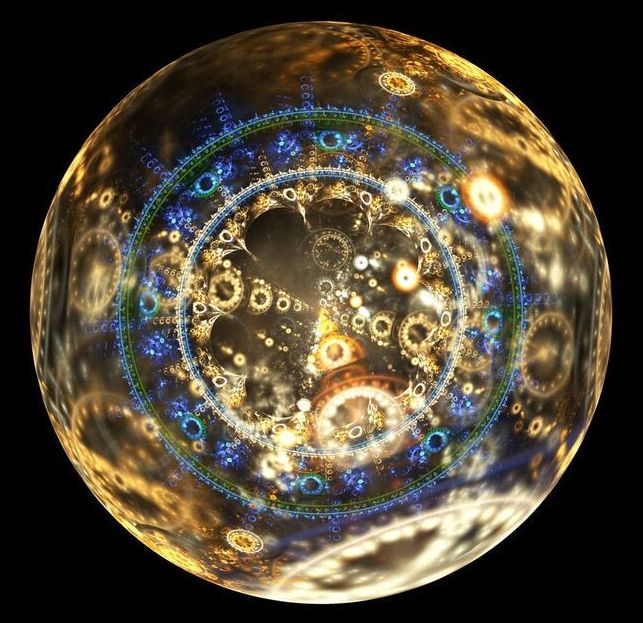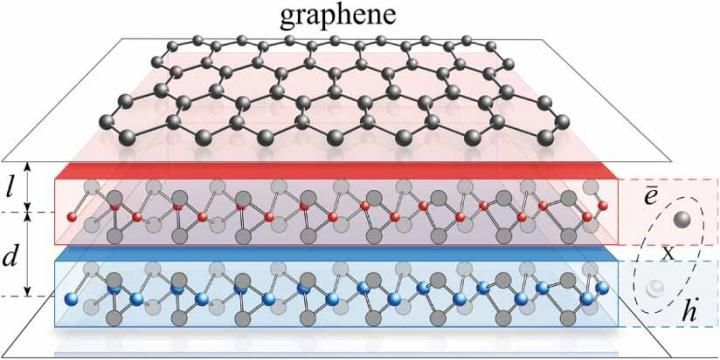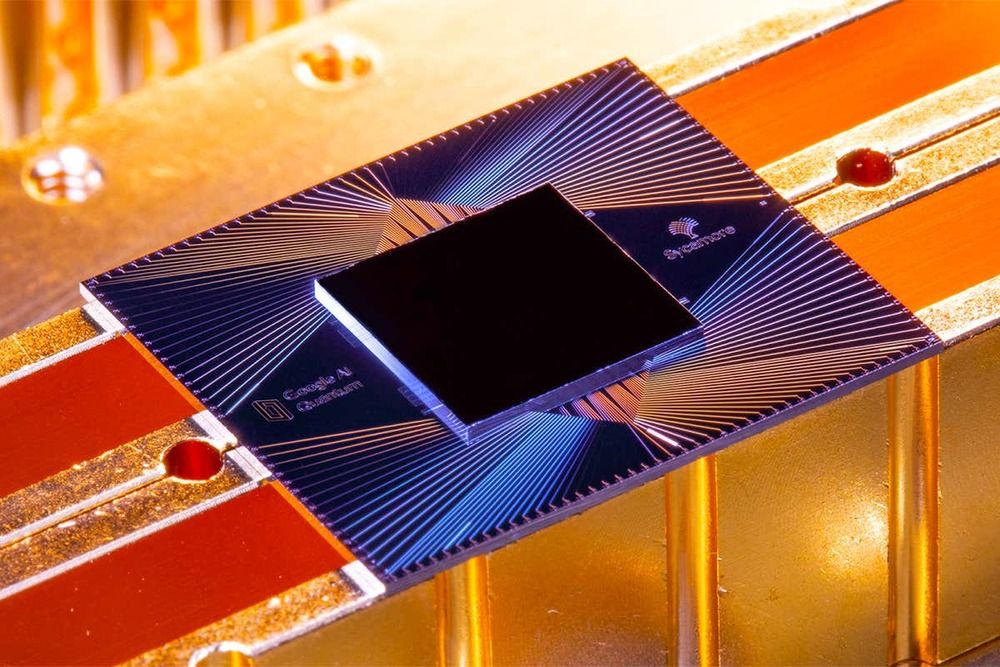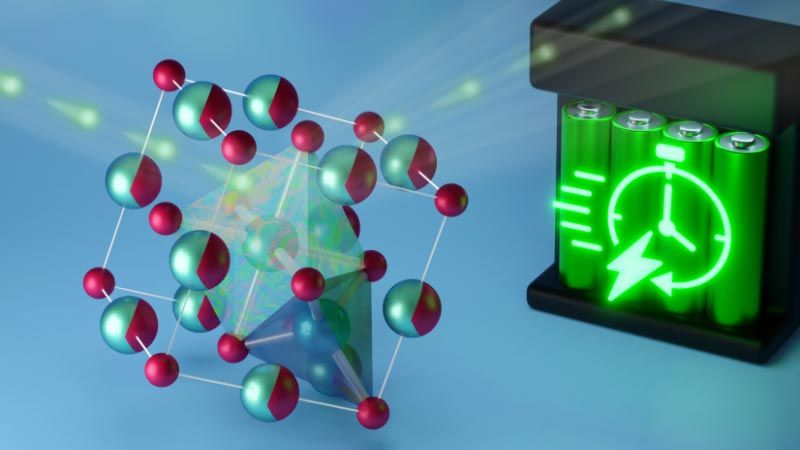The best way to build a time crystal is in a quantum simulator.



2D form of carbon transforms into a high-temperature superconductor if placed near a Bose-Einstein condensate, say theorists.
Graphene can be made to superconduct by placing it next to a Bose-Einstein condensate – a form of matter in which all the atoms are in the same quantum state. According to the theorists who discovered it, this new type of superconductivity stems from interactions between the electrons in graphene and quasiparticles called “bogolons” in the condensate. If demonstrated experimentally, the work could make it possible to develop new types of hybrid superconducting devices for applications in quantum sensing and quantum computing.
Conventional superconductivity occurs when phonons – quasiparticles that arise from vibrations in a material’s crystal lattice – cause electrons in the material to pair up despite their mutual electromagnetic repulsion. If the material is cooled to sufficiently low temperatures, these paired electrons (known as Cooper pairs) can travel through it without any resistance.
Bose-Einstein condensates (BECs) form when bosons, or particles with integer quantum spin, are cooled until they are all in the same quantum state. Within this special “fifth state of matter”, quasiparticles called Bogoliubov excitations can develop. Named after the Russian physicist Nikolaï Bogoliubov, who was the first to provide a theoretical description of them, these quasiparticles are usually known as bogolons. Ivan Savenko, who led the research at the Institute for Basic Science (IBS) in Korea, explains that bogolons are similar to phonons in the sense that they also serve as mediators for electron-electron attractions.
This next jump in battery-tech could solve a lot of EV problems.
The world of the internal combustion engine will sadly, but very necessarily, come to a close at some point in many of our lifetimes. Hybrids and electric vehicles are becoming more affordable and more advanced at a rapid pace, which means batteries are taking the place of fossil fuels. This has led to an equally rapid progression in battery technology, with the main goals of improving capacity, charging times, and safety. One major advancement in this field is the advent of solid-state batteries, which promise to push the boundaries of the limitations that current lithium-ion batteries carry.
Electric vehicles have been powered by lithium-ion batteries for years, which are similar to the ones used in laptops, cell phones, and other consumer electronics. They are constructed with a liquid electrolyte inside, which makes them heavy and susceptible to instability at high temperatures. Because each individual battery pack can’t generate all that much energy on its own, several have to be linked together in series, further adding to the weight. The cost of engineering, manufacturing, and installing battery packs makes up a considerable portion of the overall cost of an electric vehicle.
Just like a cell phone, the lithium-ion batteries in electric vehicles need to be recharged. The speed at which an electric vehicle’s batteries can be charged depends on the vehicle itself, the type of batteries it uses, and on the charging infrastructure. In general, public charging stations fall into either the Level 2 or Level 3 categories, both of which can charge an EV far quicker than a standard household outlet. Level 1 and Level 2 chargers provide power to the on-board charger via AC power, which is converted to DC power to charge the battery. Level 3, which can also be called DC Fast Charging, bypasses that on-board generator and instead charges the battery directly and at a much quicker rate. Over time, however, both the battery capacity and the ability to reach peak charging rates degrade.
Bio-Digital Twins, Quantum Computing, And Precision Medicine — Mr. Kazuhiro Gomi, President and CEO, and Dr. Joe Alexander, MD, Ph.D., Director, Medical and Health Informatics (MEI) Lab, NTT Research.
Mr. Kazuhiro Gomi, is President and CEO of NTT Research (https://ntt-research.com/), a division of The Nippon Telegraph and Telephone Corporation, commonly known as NTT (https://www.global.ntt/), a Japanese telecommunications company headquartered in Tokyo, Japan. Mr. Gomi has been at NTT for more than 30 years and was involved in product management/product development activities at the beginning of his tenure. In September of 2009, Mr. Gomi was first named to the Global Telecoms Business Power100 — a list of the 100 most powerful and influential people in the telecoms industry. He was the CEO of NTT America Inc. from 2010 to 2019 and also served on the Board of Directors at NTT Communications from 2012 to 2019. Mr. Gomi received a Masters of Science in Industrial Engineering from the University of Illinois at Urbana-Champaign, and a Master of Science in Electrical Engineering from Keio University, Tokyo. Mr. Gomi is a member of the board at US Japan Council, a non-profit organization aimed at fostering a better relationship between the US and Japan.
Dr. Joe Alexander, is Director of the Medical and Health Informatics (MEI) Lab at NTT Research, where he oversees the MEI Lab research in multi-scale Precision Cardiology platforms such as the cardiovascular bio-digital twin, as well as heart-on-a-chip technology, specifically aimed at developing the infrastructure for a digital replica of an individual’s heart. In addition, the MEI Lab is working on nano-and micro-scale sensors and electrodes, other organ-on-a-chip micro-fluidics technologies, as well as wearable and remote sensing to support future bio-digital twin applications.
Before coming to NTT Research, Dr. Alexander spent 18 years at Pfizer, Inc., where he had most recently served as Senior Medical Director, Global Medical Affairs, working in cardiovascular medicine, worldwide clinical imaging and measurement technologies, medical devices and pulmonary hypertension, and regularly conducting modeling and simulation research in many of these areas. He previously worked for two years at Merck, Inc. and spent eight years at Vanderbilt University, where he completed a two-year residency in internal medicine and served as a professor of medicine and biomedical engineering. Dr. Alexander obtained his M.D. and Ph.D. (in biomedical engineering) degrees at the Johns Hopkins University School of Medicine.

A time crystal is a unique phase of matter that flips between two states with no energy input necessary – first proposed in 2012, this type of matter has now been created inside a quantum computer built by Google. The discovery is one of the first real-world problems solved by a quantum computer, and could also be harnessed to improve them.

Like a shaggy dog in springtime, some black holes have to shed. New computer simulations reveal how black holes might discard their magnetic fields.
Unlike dogs with their varied fur coats, isolated black holes are mostly identical. They are characterized by only their mass, spin and electric charge. According to a rule known as the no-hair theorem, any other distinguishing characteristics, or “hair,” are quickly cast off. That includes magnetic fields.
The rule applies to black holes in a vacuum, where magnetic fields can simply slip away. But, says astrophysicist Ashley Bransgrove of Columbia University, “what we were thinking about is what happens in a more realistic scenario.” A magnetized black hole would typically be surrounded by electrically charged matter called plasma, and scientists didn’t know how — or even if — such black holes would undergo hair loss.

One of the biggest factors affecting consumer adoption of electric vehicles (EVs) is the amount of time required to recharge the vehicles—usually powered by lithium-ion batteries. It can take up to a few hours or overnight to fully recharge EVs, depending on the charging method and amount of charge remaining in the battery. This forces drivers to either limit travel away from their home chargers or to locate and wait at public charging stations during longer trips.
Why does it take so long to fully charge a battery, even those used to power smaller devices, such as mobile phones and laptops? The primary reason is that devices and their chargers are designed so the rechargeable lithium-ion batteries charge only at slower, controlled rates. This is a safety feature to help prevent fires, and even explosions, due to tiny, rigid tree-like structures, called dendrites, that can grow inside a lithium battery during fast charging and induce short-circuits inside the battery.
To address the need for a more practical lithium-ion battery, researchers from the University of California San Diego (UC San Diego) worked with scientists at Oak Ridge National Laboratory (ORNL) to conduct neutron scattering experiments on a new type of material that could be used to make safer, faster-charging batteries. The researchers produced samples of lithium vanadium oxide (Li3V2O5), a “disordered rock salt” similar to table salt but with a certain degree of randomness in the arrangement of its atoms. The samples were placed in a powerful neutron beam that enabled observing the activity of ions inside the material after a voltage was applied.


The image shows an elongated galaxy sandwiched, and stretched, between two galaxies. A long tail is visible in the galaxy on the right in this image: Called a “tidal tail,” this can occur when stars and gases are “stripped” from the outside arms of galaxies during a merger, according to Cosmos.
Tweet may have been deleted
The Hubble Space Telescope — the size of a large school bus — is over 30 years old. The solar-powered telescope takes detailed images of far-off cosmic objects, like Arp 195, yet the legendary instrument is wearing down with age, most recently exemplified by a computer problem that sent Hubble offline for weeks. Still, NASA expects “Hubble will last for many more years and will continue making groundbreaking observations, working in tandem with other space observatories including the James Webb Space Telescope to further our knowledge of the cosmos.”

Forget Google Search and Fuchsia. Researchers from Google, Stanford, Princeton, and other universities might have made a computer discovery so big we can’t fully comprehend it yet. Even Google researchers aren’t entirely sure that their time crystal discovery is valid. But if it turns out to be accurate, then Google might be one of the first companies to give the world a crucial technological advancement for the future. Time crystals will be an essential building block in quantum computers, the kind of computers that can solve complex problems with incredible speed and power technologies that aren’t even invented.
What is a quantum computer?
Google isn’t the only company building quantum computers, and these types of machines keep popping up in the news with regularity. Quantum computers won’t reach your phone, and they’re not going to play games. Even if they did, Nintendo will totally ignore the latest computer technology when designing future consoles.